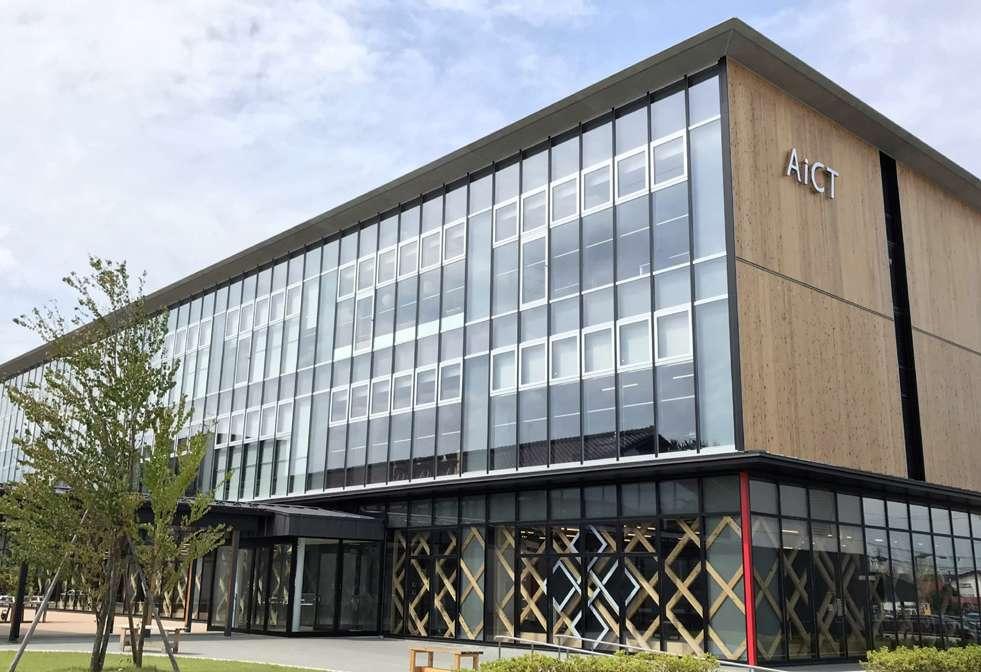
8 minute read
PARTNER CONTENT
URBAN PRIVACY
Small Japanese towns look to lead world in smart-city tech
Advertisement
By Eiki Hayashi
Japan’s regional towns are taking a new approach to smart cities, which use digital technology to improve functionality and livability.
In the United States and China, which lead the field, people’s distrust of having personal information collected en masse is an obstacle to expanding smart cities. However, Japan is finding success in taking the opposite tack and making the provision of personal information optional.
Data is the lifeblood of smart cities, and new standards are developing in how data is handled.
Japan’s leading smart city is being built in Aizuwakamatsu in Fukushima Prefecture, a region famous for its sake and samurai tradition. At Takeda General Hospital, a male patient was using his smartphone to pay his bill. The system is a trial for using QR codes in electronic payments. “We want to make things more convenient by using QR codes; not just for paying hospital bills, but also for taxes, transportation, and regular purchases,” said Keisuke Kobayashi of TIS Inc., the company that developed the system.
TIS also wants to reduce the time people spend at hospitals by offering services such as online booking of appointments and medicine delivery. The company envisions preventive health services, like remote medical care and artificial intelligence-based diagnoses.
Other companies are also hard at work in Aizuwakamatsu, enhancing mobility, education, energy, agriculture, and manufacturing. These include NEC Corporation, Toppan Printing Co., Ltd., Coca-Cola (Japan) Company, Limited, SoftBank Group Corp. and Mitsubishi Corporation, all of which are collaborating under one roof at the AiCT innovation center.
TRUST MATTERS With a population of only 120,000, Aizuwakamatsu is a surprise as a leader of urban development. This can be attributed to its unique model, in which residents choose if they want to provide personal information in exchange for smart services. “Unless you have an ‘opt-in’ model, in which each service is expressly given permission to collect personal data, you won’t be able to gain trust,” said Shojiro Nakamura of consultancy Accenture, which oversees the project. “Without the residents’ trust, smart urban developments will fail.”
The city is working to win over residents by clearly stating the benefits of opting in. To increase transparency and assure people that personal information will not be misused, data management will be overseen by the community.
This year, for example, an idea was floated to install sensors in the parking lot of a local tourist attraction to determine if there might be a way to increase its appeal. But the city nixed the sensors, saying the technology might make residents nervous.
Still, about 20 percent have registered for some kind of smart service. This is expected to rise to 30 percent by the end of fiscal 2020.
“It’s important that we deepen our understanding of smart cities,” said Nakamura. When registration reaches 50 percent, the city will allow residents to opt in for all services as a bundle,
The United States and China have been criticized for their handling of personal information
China Led by the government
n
n
n Large-scale planning in more than 100 cities Massive data collection Has already proposed international standards
n Government monopolizes huge amounts of data
United States Led by the private sector
n
n
n Companies owning data participate Startups and universities join in Government financial support
n Google, Amazon and other companies monopolize data
Public backlash against mandatory collection of personal information
SOURCE: NIKKEI
rather than one by one. When it reaches 70 percent, the system will be considered to have gained residents’ trust and will share personal data by default. But residents can still opt out of the arrangement.
The reason for the caution is that sloppy handling of personal information is causing problems for smart cities in the United States and China.
In May this year, a Google group company in Toronto announced that it would withdraw from a smart city project there. The company blamed growing uncertainty caused by the coronavirus pandemic and privacy concerns from residents, who described the project as a surveillance society “dystopia” and citizens as “lab rats” over fears personal information could be gathered and misused.
In China, Alibaba Group Holding Limited, Tencent Holdings Ltd., Baidu, Inc., and other companies are participating in the government-led planning of more than 100 smart cities. The government has already proposed international standards for smart cities to the International Organization for Standardization, but many Chinese are wary about the government’s centralized data management.
OPEN ACCESS Japan aims to take a more transparent approach to handling personal data. In May, the government amended a law to expand smart cities characterized by “open access.”
By standardizing the urban operating system—the basic soft ware for smart cities—multiple cities can be connected to data infrastructure that collects and organizes information. This eliminates the need for each city to build its own infrastructure from scratch, making it easier for less-developed towns to make the transition. As more cities become connected, greater amounts of data can be gathered, enabling better and more targeted services.
WHAT IF CHINA’S APPROACH GOES GLOBAL?
By Hiroyuki Akiyama
The Japanese government has grown increasingly concerned about China’s proposed international standards for smart cities, worried about a competitive disadvantage as companies vie for business.
China has already submitted smart city proposals to both the International Organization for Standardization (ISO) and the International Electrotechnical Commission, according to a source close to the Japanese government.
Three of the seven confirmed proposals from China are due to come up for a vote around year-end. A new standard needs a two-thirds supermajority to pass.
Should China’s proposals become the international standard, this would have repercussions for not only Japanese and Western companies, but also national security.
China has independently submitted 16 proposals to establish committees within the ISO and the International Electrotechnical Commission (IEC) since 2014, a March survey shows, accounting for 25 percent of the total. Japan has submitted only two proposals. Normally, the country that proposes the committee takes its organizing post.
Japan is aligned with the United States, the United Kingdom, France, and Germany on the international bodies. But China can count on African and Middle Eastern support. If passed, Chinese standards will go into force after about three years of deliberation.
HEALTHY OPPORTUNITY
The contents of the Chinese proposals have not been made public but, based on the titles and the table of contents, appear related to residential surveillance systems in the context of the coronavirus pandemic.
The proposals deal with handling data tied to monitoring residents and tracking movements during public health emergencies, the Japanese government has said in an internal memo.
China is using “health code” apps to track people’s movements and curb the virus’s spread. An individual’s infection risk is determined by analyzing GPS data and medical records. Visitors to shopping centers and transit stations are asked to show their color-coded health codes on their smartphone screens before entering.
Supporting the health codes is the Chinese government’s strategic platform that collects data on citizens. China plans to construct more than 100 smart cities across the country, replete with facial recognition cameras and drones.
DANGERS
China is accused of using facial recognition to track residents of Xinjiang, home to the Uighur minority.
“China’s Communist Party is building a surveillance state unlike anything the world has ever seen,” US Vice
Accenture will introduce the urban operating system developed in Aizuwakamatsu to the city of Kashihara, in Nara Prefecture, and may launch it in other cities. Toyota Motor Corporation and NTT are planning a smart development called “Woven City” in Susono, Shizuoka Prefecture. “It seems Woven City is also looking to work with other cities by providing connectivity among systems,” said Toru Hyakushima, a researcher at NLI Research Institute.
On August 26, US venture capital company Scrum Ventures and six Japanese companies, including Toyota Research Institute Advanced Development and East Japan Railway Company, announced SmartCityX, which will jointly create services to solve regional issues through smart cities.
According to a study by US-based market intelligence advisory International Data Corporation, global spending on smartcity technology will climb to ¥13 trillion ($122.7 billion) in 2020, rising to ¥20 trillion in 2023. Japan’s open strategy aims to make it easier to implement international standards in urban planning. If the model becomes a global standard, Japanese smart-city services would be an easy sell to the rest of the world.
“Japan faces daunting social issues, such as a declining birthrate, aging population, and frequent natural disasters,” said NLI Research’s Hyakushima. “If a series of groundbreaking services that help solve these issues is developed in smart cities here, Japan may catch up to the United States and China.” n

President Mike Pence said in a speech last October. Authorities make ethnic minorities give up blood samples, fingerprints and iris scans, he said.
“China is now exporting to countries in Africa, Latin America, and the Middle East the very same technological tools that it uses in its authoritarian regime—tools that it’s deployed in places like Xinjiang,” Pence said.
Smart cities use artificial intelligence and Big Data to run urban centers in an energy-saving manner. But Japan and Western countries seek a balance between privacy and technological convenience. Global spending on smart-city initiatives will rise about 20 percent on the year to $124 billion in 2020, according to International Data Corporation.
The World Trade Organization calls on members to craft their domestic standards based on the international standard. Should China’s proposals gain sway, Chinese companies would have a leg up even in such areas as government procurement.
Japan will seek to have a greater voice in setting international standards by creating a cabinet-level office in fiscal 2020. The idea is to actively install Japanese representatives on standards committees abroad and to map out a strategy at home.
©2020 Nikkei Inc. Nikkei Asia is published by Nikkei Inc. All rights reserved.





